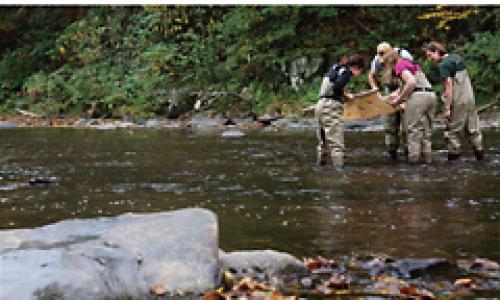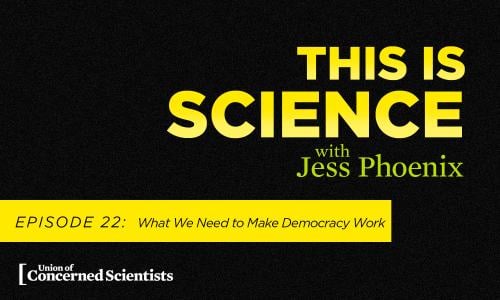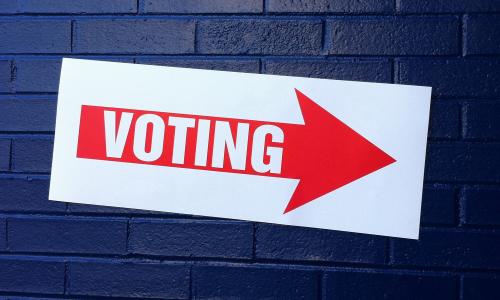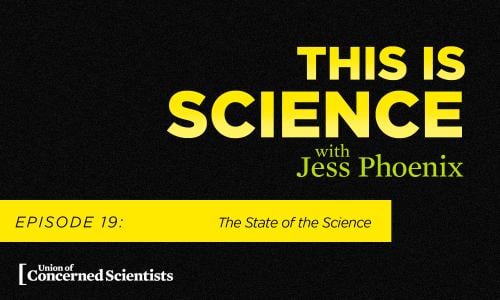Investigative researcher Taryn MacKinney discusses what is on the line for science and justice, and how the Biden administration can continue and improve its support for science.
In this episode
Colleen and Taryn discuss:
- the state of federal science on year into the Biden administration
- Biden's commitment to environmental justice
- areas where the Biden administration needs to improve
Timing and cues
Opener (0:00-0:29)
Intro (0:29-1:57)
Interview p1 (1:57-13:04)
Break (13:04-13:39)
Interview p2 (13:39-24:09)
Throw (24:09-24:15)
Segment (24:15-27:56)
Outro (27:56-29:00)
Credits
Science in Action: Matt Beyer
Editing: Omari Spears
Additional editing and music: Brian Middleton
Research and writing: Pamela Worth and Cana Tagawa
Executive producer: Rich Hayes
Host: Colleen MacDonald
Related content
Full transcript
New presidential administrations inherit the White House as is––that is, they take on the issues and messes from the past person in office. The Biden administration faced an especially troubling mess concerning federal science policies. The Trump administration took a hammer to science during its term through attacks on the federal science workforce… and its denial of climate change and the severity of the COVID 19 pandemic.
One year later, how has the Biden administration managed to restore federal science? Pretty well, it turns out, with a lot of room for growth. In a new report released by the Union of Concerned Scientists, the Biden administration has shown some improvements in increasing the number of scientists in the federal workforce and made a commitment to focusing on justice in environmental issues. However, they still have much work to do.
The Biden administration must ensure that federal science doesn’t become an absolute mess again when a new president takes office. Science’s place in democracy should not be left to the whims of political leaders, and it needs to be protected through rules and safeguards. UCS Investigative researcher Taryn MacKinney discusses what’s on the line, and how the Biden administration can continue and improve its support for science.
Colleen: Taryn, welcome to the podcast.
Taryn: Thank you so much for having me, Colleen.
Colleen: I know you've been keeping a close eye on President Biden and his administration since he took office looking at a number of science-related issues. What are the biggest challenges that the Biden administration has faced in the first year?
Taryn: Well, to answer any questions about the challenges of 2021, I think we have to sort of start with 2020. The pandemic killed hundreds of thousands of people in the U.S., the country was plagued by natural disasters including, wildfires made worse by climate change. And the president at the time was spouting misinformation about COVID-19, for example, and even the 2020 election. And all the while, federal science was under attack. So, the Trump administration, muzzled scientists, stalled research, hired partisan hacks instead of qualified experts. The list goes on and on. And actually, we tracked probably 200-some attacks on science that happened under the Trump administration. So when Joe Biden and Kamala Harris were sworn in, in January 2021, their administration inherited all of these crises and then some.
Colleen: President Biden stated at the very beginning that he would listen to the science. Has he done that?
Taryn: I think that the previous president set an exceedingly low bar for what listening to the science looked like. But even given that low bar, I think that so far Biden has gone above and beyond on prioritizing science, listening to experts, both in and outside of government, and also doing their best to bring scientists back to government after enormous losses that we saw under the Trump administration.
Colleen: So, I was astounded by the sheer number of federal scientists that left. So, let's look at the numbers for a minute. I mean, I know you did an analysis last year of staffing data from federal agencies, so can you tell us how many scientists left?
Taryn: Yes. So, we did some analysis last fall, where we looked at years of staff...actually, in some cases, decades of staffing data from federal agencies. And we found that five federal agencies alone lost more than a thousand scientists collectively between 2016 and 2020. And these are scientists of all stripes, biologists, economists, engineers, doctors, everything in between. So those are really horrifying statistics, but agencies also were impacted equally. So, for example, the environmental protection agency lost a ton of scientific staff about 6%, which doesn't sound too big until you learn that that is about or almost 700 people. And those losses happened across fields.
So, for example, the EPA lost 1 in 10 chemists and one in five ecologists. And the Fish and Wildlife Service lost about 4% of its scientific staff, which is about 230 people, which is astonishing. And the research branch of the Department of Education, which is pretty small lost about 33 scientific staff, which doesn't sound like too much, but that's actually a 19% decline in scientific staff in that branch. And these aren't nameless, faceless, automatons, these are human beings who've dedicated their careers to the public good. I mean, these are the scientists and the experts who work for the government on behalf of the public of us, right? You know, you, me, your grandma, all of us need these experts.
Colleen: And what are some examples of the type of research that these scientists do?
Taryn: These are the scientists who mapped the human genome and created the World Wide Web. And these are also the scientists who work every day to protect our food supply, study climate change, keep our water and air clean and so much more.
Colleen: The numbers of scientists who left is dramatic. How devastating is this loss of institutional scientific knowledge?
Taryn: One of the most glaring, I wanna say scandals because it was so controversial was the Trump administration just abruptly announcing that the research branches of the Department of Agriculture were gonna be moved to Kansas City, Missouri from DC. And that had astonishing impacts on those agencies' scientific output. I mean, tremendous drop in staffing. And that was in 2019 was when the Trump administration abruptly for no clear reason, decided to move the research arm of the Department of Agriculture from Washington DC to Missouri. And essentially gave all of those scientists many of whom had deep institutional knowledge and had worked at the USDA for decades. They were essentially told, "Okay you have 60 or 90 days to decide whether you and your family are gonna up and move to the Midwest." And that's an incredible ask of the staff.
And three and four of them, 75% of them, were forced to resign or retire taking with them truly decades of institutional knowledge, probably collectively many centuries. And the results of that were profound. I mean, economic reports just slowed to a trickle. There were studies that had been ongoing for many years that crumbled. And millions of dollars in funding for research on these vital areas like climate change, food security, antibiotic resistance, that funding just sort of sat unreleased.You know, gathering dust. that erosion of staffing has real impacts not only on the agencies and the staff who work there but on anyone in the U.S. who are affected by the policies that they help create and the science that they conduct, which is everybody.
Colleen: Yeah, I wonder what happens to studies if you're collecting data and you're collecting data, and then all of a sudden you can no longer that data when it's interrupted like that . Is that the death knell for the project that you're working on?
Taryn: For many research projects, it can be, partly because there are so many moving parts to each research project that happens both at federal agencies and anywhere. For example, in academia, you have funding for these projects. You have the process of gathering data. You have the process of maintaining data and cleaning data. And if one of those foundations falls apart, because of political retaliation, because of political attack or stalled research, that can have huge implications for the project as a whole, which I think a lot of scientists found during the Trump administration, including several that went on to define work here at UCS. For example, my colleague, Jacob Carter, who's on my team with the Center for Science and Democracy, previously worked for the EPA on incredibly crucial research about how climate change was going to impact flooding risks in coastal communities, which are more likely to have, especially impoverished communities that are more likely to have high numbers of these extremely toxic Superfund sites. And flooded Superfund sites are terrible news for people who live there. But that research didn't go anywhere. Once the Trump administration came to office, his research stopped.
Colleen: So, has the Biden administration been able to rectify the situation? Have more scientists been hired? What's the status now?
Taryn: the answer's a little complicated. So far in 2021, hiring progress has generally been mixed. It depends a lot on the agencies. So of the agencies, we've looked at, the public health agencies have fared best. for example, the CDC has grown by 18% since December 2020. And the FDA has grown by 7% that's about 1,000 new scientists at the FDA. Now that's great news, particularly, because we're in a pandemic. But other agencies are struggling more to replace the expertise that was lost under the previous administration. So, for example, as of September 2021, that's as far as our data goes, the Fish and Wildlife Service and the EPA had actually lost a few more scientists. Not many, but that's significant. And it's very clear that a lot more needs to be done to beef up those numbers and bring the scientists back.
Despite the uneven hiring across agencies, President Biden does deserve credit for asking scientists to lead. So, we've also been tracking the administration's progress, filling about 100 high-level science positions that are selected by the president. And so far, President Biden has announced nominations for 85 of them. And 72 of them have been finalized. Now, that's lightning-fast compared to President Trump, who in his first year had announced only 43 nominations, and only 28 of which were finalized in a year.
Colleen: And in addition to needing more scientists, federal science needs a healthy democracy in which to operate. So, what have you been focusing on with regard to the risk to our democracy?
Taryn: well, as you know, Colleen, I work for a branch of UCS called the Center for Science and Democracy. And inherent in the name of that department is a pretty simple truth, which is that science and democracy need each other. So without a functioning democracy, none of our other hopes for health, safety, education, a stable climate, none of those are possible. Now, so far, the Biden administration has made clear that it values science in a way that its predecessor didn't, but science alone isn't enough. We need a healthy democracy too. And right now that's under attack. So, in the coming months, the Biden administration has to prioritize voting rights, which have stalled in Congress because of antiquated procedures that has to change. And that's something that UCS is gonna be watching very closely.
Colleen: So environmental justice took a big hit in the previous administration and President Biden has made some strong commitments to address the injustices faced by communities across the nation. What specifically has he done and are we seeing progress?
Taryn: Yes. So, the short answer is we have seen progress. Although I wanna take a moment to explain what environmental justice is. So, centuries of discrimination in law, government, education, you name it, have led to enormous inequities that hurt some people more than others. So, they’ve saddled Indigenous, Black and other people of color as well as low-income communities with higher exposure to pollution, less access to healthcare, less representation in government. So the goal of the environmental justice movement is to identify and address those inequities and more broadly fight for communities rights to safety and self-determination. But as you mentioned, that movement took a huge hit under the Trump administration which worked to dismantle policies that protect marginalized communities. Now, fortunately, the Biden administration has acted quickly on that front. So, in its first week alone the Biden administration, well President Biden signed two new executive orders focused on racial equity and the environment. And, the administration has also pledged to dedicate at least 40 percent of energy and infrastructure spending to disadvantaged communities, that’s the Justice40 initiative. So, those are really exciting things to see.
Colleen: So, are we actually seeing these practices implemented across agencies? And are we seeing action based on the executive orders?
Taryn: So agencies are starting to implement those changes and work to combat racial inequity. So, for example the CDC declared racism a public health threat, and the National Institutes of Health, the NIH, started a new initiative to strengthen racial equity in the research workforce. So those are all good things, but elsewhere things are not unfolding as planned. So, for example, in early- to mid- January, two high profile environmental justice officials left the White House Council on Environmental Quality. That’s been really alarming, not only for EJ advocates in the administration but activists and grassroots organizers who are justifiably worried about what those departures mean for Biden’s work on environmental justice. So, in short, the Biden administration is trying to lay the foundation for sustained efforts towards environmental justice, which is great news, but we are also seeing setbacks.
Colleen: So how binding are the changes that have been made so far. Will the next president be able to undo them?
Taryn: I think the short answer is ideally, no. I mean, if these things were solidified legislatively, in other words, if Congress said, it really matters that scientists are protected in government and that's why we're going to reinforce these protections in binding laws, that would be great. Now, things are stalled in Congress so that may not be where we see progress. But at a minimum, what the Biden administration is doing is trying its best to codify those protections in agencies in regulation. So not via Congress, not via laws, but via policies, and procedures, and regulations, and agencies, which, of course, sound terribly boring, but those policies and regulations can be so important for making sure that this never...these attacks on science that we saw under the Trump administration do not happen again.
It's also really important that the Biden administration makes sure that it's clear about that priority because picture this, you're a recently minted scientist, you're fresh out of grad school, and for years you watched the previous administration undermine scientists. And now the Biden administration is beckoning to you saying, "Oh, join us. It'll be different this time." Now, even though the Biden administration is working to make sure that it is different this time, you know, that scientists are protected, I also don't blame early-career scientists for being wary. And that reputation is something that the Biden administration well, and beyond the Biden administration has to wrestle with and has to fix.
Colleen: That sounds like the perfect segue to scientific integrity, which should offer protections for scientists if the right policies are in place. Talk to me about the state of scientific integrity.
Taryn:Right. So I guess a little bit of context, I mentioned that the Biden administration needs to hire more scientists. That's very clear. But hiring is only one side of the coin, you also have to keep employees. And what the White House is trying to do to create a culture that supports employees and uplifts scientists, what it's trying to do is build a set of rules and regulations that keep them safe. Now, we call those scientific integrity policies. Those are the rules and regulations that protect scientists from political interference and make sure that science is being used properly by decision-makers. And the Biden administration has made tremendous progress on this front. So, for example, President Biden signed a memo requiring every science agency to have a scientific integrity official. That's an enormous step in the right direction. He also elevated his science advisor to the cabinet-level,
And in June, President Biden also directed agencies to promote diversity and equity, and inclusion in their workforces. All of these things, all of these steps are trying very hard to make federal science, a safe place that not only attracts scientists including early-career scientists, which are very important for combating an aging federal workforce, but also makes them want to stay. Now, that's, that's gotta be the most important thing. These are such important steps in part, because as we saw under the previous administration, weak protections for federal science make it so easy for bad actors to take advantage.
Colleen: So, what are you gonna be watching closely in the coming months?
Taryn: One of the big things that we'll be watching for is progress on hiring scientists. The mixed progress that we've seen so far is both surprising and unsurprising. You know, it's surprising because the Biden administration is trying to hire. It wants a stronger civil service. There are thousands of job postings open for positions across the federal government, but it's also unsurprising that the progress has been mixed and may be slower than we wanted because the hiring process for federal jobs kind of stinks. It's slow, and it's tedious, and it's often difficult to navigate, and that's something that the Biden administration needs to improve. So, that's something that we're gonna be watching pretty closely in the coming months.
Colleen: Where does the administration need to do better?
Taryn: So, on most of the issue areas, we have seen great steps in the right direction even though more must be done. But the big exception to that is President Biden and the Biden administration's work on nuclear weapons, which is of grave concern . Now, back in 2017, President Biden criticized the expansion of the U.S. nuclear weapons arsenal, but the White House's first budget request did absolutely nothing to scale down the previous administration's record-breaking nuclear spending. And now our nation is on track to spend more than a trillion dollars on its nuclear arsenal over the next 30 years. That's an obscene investment in a type of weapon that could end humanity. And that's something that the Biden administration has to do better on.
Colleen: So Taryn, give me your top five list of the things that you really wanna see this administration do.
Taryn: Well, first of all, limiting this list to five goals is pretty hard. I'll give it a shot, but I should say that before we can even start talking about goals, all of these goals are contingent on a functioning democracy, which is at risk right now. I'd consider that an umbrella priority. And once we've got that umbrella priority solved, once we have voting rights protected, and this critical legislation passed, then we can worry about these priorities. But I probably start with number one, expand the federal scientific workforce and solidify policies that will keep that workforce safe from political interference.I would say number two, set even bolder goals on combating climate change and work with the world to solve the climate crisis. I would say number three, follow through on your promises to prioritize environmental justice and the wellbeing of marginalized people in the U.S. I'd say number four, do everything you can to make our transportation, energy, and food systems more equitable and more sustainable for the long run. And I think above all, please listen to the experts, lead with science, speak the truth because that is something all of us are counting on.
Colleen: Taryn, thanks so much for joining me on the podcast. This has been a great conversation.
Taryn: Thank you so much, Colleen. Return to top



